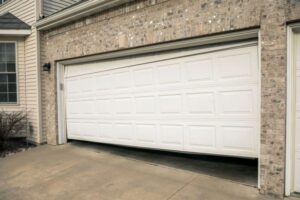A noisy garage door can be quite an annoyance, especially when it disrupts the peace of your home early in the morning or late at night. The sound of a screeching, rattling, or grinding garage door is not just irritating—it could also signal a problem that needs immediate attention. If you’re dealing with this issue, you’re not alone. Many homeowners in Franklin Lakes face noisy garage door problems. The good news is that with the right approach, most of these issues can be fixed either on your own or with the help of a professional. In this article, we’ll explore the common causes of garage door noise, provide DIY solutions, and discuss when it’s time to
call in a professional for garage door repair in Franklin Lakes, NJ.
Identifying the Source of the Noise
Before you can fix a noisy garage door, it’s crucial to identify what’s causing the problem. There are several potential culprits when it comes to garage door noise. Knowing the exact source will help you determine the best course of action.
Common Causes
- Loose Hardware: Over time, the constant movement of your garage door can cause nuts, bolts, and other hardware to loosen. This can result in rattling or banging noises when the door is in operation.
- Worn Rollers: The rollers are responsible for guiding your garage door along the tracks. If they are worn out or damaged, they can cause a screeching or grinding noise.
- Lack of Lubrication: Like any other mechanical system, your garage door’s moving parts need to be properly lubricated. Without adequate lubrication, the door may produce squeaking or grinding sounds as the metal parts rub against each other.
How to Pinpoint the Exact Issue
To fix a noisy garage door, you first need to identify where the noise is coming from. Here’s a step-by-step guide:
- Observe the Door in Motion: Stand inside your garage and open and close the door a few times. Pay attention to where the noise seems to be coming from. Is it at the hinges, the rollers, or the tracks?
- Check the Hardware: With the door closed, inspect the nuts, bolts, and screws. If any of them appear loose, you may have found your culprit.
- Examine the Rollers: Rollers should glide smoothly along the tracks. If they wobble or look worn out, it’s likely they’re causing the noise.
- Test the Springs: The springs help lift the garage door. If they’re under too much tension or worn out, they can produce a loud banging noise.
DIY Fixes for a Noisy Garage Door
Once you’ve identified the source of the noise, you can try some simple DIY fixes to get your garage door operating quietly again. Here are a few common solutions.
Lubricating Moving Parts
One of the easiest and most effective ways to reduce noise is to lubricate the moving parts of your garage door. Use a garage door lubricant specifically designed for this purpose, and apply it to the following areas:
- Rollers: Apply lubricant to the rollers, making sure to get it into the bearings. This will help reduce friction and noise.
- Hinges: Lubricate the hinges where they connect the panels of the door.
- Springs: Apply a generous amount of lubricant to the springs to ensure they operate smoothly.
Regular lubrication not only reduces noise but also prolongs the life of your garage door. If you need help with lubrication, a garage door tune-up from a professional can include this service.
Tightening Loose Bolts and Screws
Another common cause of noise is loose hardware. To fix this, you’ll need a wrench or socket set:
- Check All Bolts and Screws: Start by inspecting all the bolts and screws on the door and its tracks. Tighten any that appear loose, but be careful not to overtighten, as this can strip the threads or damage the hardware.
- Inspect the Brackets: The brackets that hold the rollers in place should also be checked for tightness. Loose brackets can cause the rollers to misalign, leading to noisy operation.
Replacing Worn Rollers
If your garage door’s rollers are worn out, they can make a lot of noise. Here’s how you can replace them:
- Purchase New Rollers: Look for high-quality rollers that are compatible with your garage door model. Nylon rollers are a good choice because they’re quieter than metal ones.
- Remove the Old Rollers: Begin by unplugging the garage door opener to prevent any accidental operation. Use a wrench to remove the bolts holding the roller brackets in place, then slide the old rollers out.
- Install the New Rollers: Slide the new rollers into place and reattach the brackets. Make sure everything is securely fastened before testing the door.
These simple fixes can solve most noise problems. However, if the noise persists, it might be time to call a professional for emergency garage door repair.
When to Call a Professional
While many garage door noise issues can be fixed with some basic DIY skills, there are times when it’s best to leave the job to a professional. Here’s when you should consider calling a garage door technician.
Situations Where Professional Intervention is Necessary
- Complex Repairs: If the source of the noise is related to the springs, tracks, or opener, you may need professional help. These components can be dangerous to repair without the proper tools and experience.
- Persistent Noise: If you’ve tried lubricating the moving parts, tightening the hardware, and replacing the rollers, but the noise continues, it’s time to call in a professional. They can diagnose and fix issues that may not be immediately apparent.
- Regular Maintenance: Even if your garage door isn’t currently making noise, regular maintenance from a professional can prevent future issues. A garage door tune-up typically includes lubrication, tightening of hardware, and inspection of all components.
Benefits of Expert Repair Services
- Safety: Garage doors are heavy and operate under a lot of tension. A professional technician knows how to handle these components safely, reducing the risk of injury.
- Efficiency: Professionals have the right tools and expertise to diagnose and fix problems quickly, saving you time and frustration.
- Long-Term Savings: While it might be tempting to handle all repairs yourself, improper fixes can lead to bigger problems down the line. Investing in professional garage door repair can save you money by preventing costly future repairs.
In Franklin Lakes, expert technicians are always available to provide reliable garage door repair services whenever you need them so don’t hesitate to contact them.
Preventative Maintenance Tips
To keep your garage door operating quietly and smoothly, it’s important to stay on top of regular maintenance. Here are some tips to help you maintain your garage door.
Regular Lubrication and Inspections
Regular lubrication is one of the easiest ways to keep your garage door quiet and functioning properly. As mentioned earlier, applying garage door lubricant to the rollers, hinges, and springs can significantly reduce noise. But lubrication isn’t the only maintenance task you should be doing.
- Inspect the Tracks: Check the tracks for any debris or obstructions that could cause the rollers to stick or make noise. If necessary, clean the tracks with a damp cloth and make sure they’re aligned properly.
- Test the Balance: A garage door that’s out of balance can put extra strain on the opener and make noise. To test the balance, disconnect the opener and manually lift the door halfway. If it stays in place, it’s properly balanced. If it moves up or down, you may need to adjust the springs or call a professional.
- Check the Weatherstripping: The weatherstripping along the bottom of the door helps keep out drafts and debris, but it can also wear out over time. If it’s cracked or brittle, replace it to maintain a tight seal.
How to Keep Your Garage Door Running Smoothly
Preventative maintenance isn’t just about addressing problems as they arise; it’s also about taking steps to prevent them in the first place. Here are some tips to keep your garage door running smoothly for years to come:
- Schedule Regular Tune-Ups: Just like your car, your garage door needs regular tune-ups to keep it in top condition. During a garage door tune-up, a technician will inspect, lubricate, and adjust all the components to ensure they’re working properly.
- Replace Worn Parts: Don’t wait until parts fail to replace them. If you notice any components that are worn or damaged, such as the rollers, springs, or cables, replace them promptly to prevent more significant problems.
- Limit the Opener’s Usage: While it might be convenient to use your garage door opener for every little task, excessive use can wear out the components more quickly. Try to use the door manually when possible to extend its lifespan.
By following these maintenance tips, you can avoid the hassle of unexpected repairs and keep your garage door functioning quietly and efficiently.
Conclusion
A noisy garage door is more than just a nuisance; it can be a sign of underlying issues that need attention. By identifying the source of the noise and taking steps to fix it, you can restore peace and quiet to your home. Whether it’s tightening loose bolts, lubricating moving parts, or replacing worn rollers, there are plenty of DIY fixes you can try. However, if the noise persists or the repairs are too complex, don’t hesitate to call in a professional for garage door repair in Franklin Lakes, NJ.
At
Closing Masters Garage Doors, we’re here to help with all your garage door needs. From routine maintenance to emergency repairs, our team of expert technicians is dedicated to providing top-quality service. Don’t let a noisy garage door disrupt your home—give us a call today to schedule your garage door repair in Franklin Lakes, NJ.
Frequently Asked Questions
What causes a garage door to make noise?
Several factors can cause a garage door to make noise, including loose hardware, worn rollers, and a lack of lubrication. Identifying the source of the noise is the first step in fixing the problem.
Can I fix a noisy garage door myself?
Yes, many noise issues can be resolved with DIY fixes such as lubricating moving parts, tightening bolts, and replacing worn rollers. However, more complex repairs may require professional help.
How often should I lubricate my garage door?
It’s recommended to lubricate your garage door’s moving parts at least twice a year. Regular lubrication can reduce noise and prolong the life of the door.
When should I call a professional for garage door repair?
You should call a professional if the noise persists after trying DIY fixes, or if the repairs involve complex components like the springs or opener. Professional technicians have the tools and expertise to handle these repairs safely and efficiently.
What is a garage door tune-up?
A garage door tune-up is a comprehensive maintenance service that includes lubricating the moving parts, tightening the hardware, and inspecting all components to ensure they’re in good working order. It’s a good way to prevent noise and other issues.
How can I prevent my garage door from making noise?
Regular maintenance, such as lubrication, inspections, and replacing worn parts, can prevent your garage door from making noise. Limiting the opener’s usage can also help extend the life of the components.
Is a noisy garage door dangerous?
While a noisy garage door isn’t always dangerous, it can be a sign of an underlying issue that needs attention. Ignoring the noise could lead to more serious problems down the line, so it’s important to address the issue promptly.
Can commercial garage doors be fixed in the same way as residential ones?
Yes, the basic principles of garage door repair apply to both residential and commercial garage door repair. However, commercial doors may be larger and more complex, so professional assistance is often recommended.

